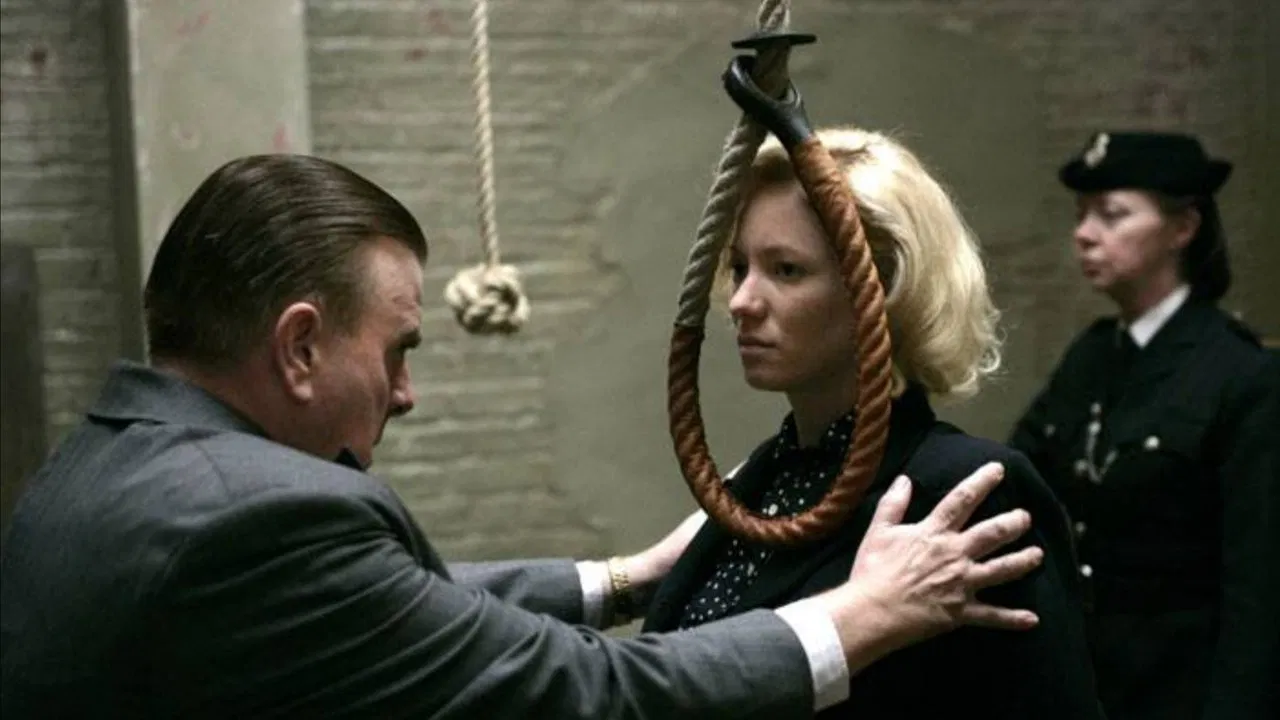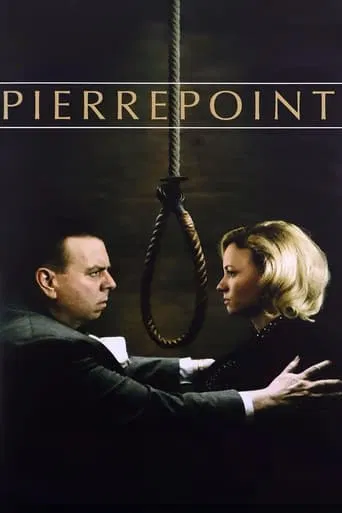

terrible... so disappointed.
... View MoreOverrated
... View Morei know i wasted 90 mins of my life.
... View MoreCharming and brutal
... View More"Pierrepoint: The Last Hangman" is a very well-directed and produced film that tries to delve into the character / psyche of Britain's most famous (although definitely not the last) hangman of the 20th century, Albert Pierrepoint, one who carries on the family tradition with great aplomb ! The performance by Timothy Spall in the lead role was brilliant. Spall succeeds in portraying a very positive image of Pierrepoint, a man of high personal values who adheres to a high code of conduct. The movie is based on Albert Pierrepoint's biography and conveys him as the "quintessential professional", who has a (rather unpleasant)job to do and is hell-bent on doing it to the very best of his abilities. The performances by Juliet Stevenson (as Pierrepoint's supportive but troubled wife) and Marsden (as his pub mate, "Tish") are also noteworthy.Throughout his more than two decades long "successful career",Pierrepont goes about his job with a high sense of professional detachment. He is not at all interested in knowing about or passing any judgements on the crimes of his condemned prisoners, whom he is required to despatch from this world. He is just focused on "their height, weight and physical condition" so that he can put an end to their lives in the quickest and most efficient manner; a thorough professional who takes immense pride in being the undoubted No. 1 in his vocation in the entire country.But then one day something happens which shakes his soul and makes him seriously contemplates the correctness of capital punishment and his key role in its implementation.It is indeed a very dark and gloomy film with several "trying" moments. A film that forces the viewer to think and stays with him / her long afterwards. What I really liked was the fact that the film does not take any overt position on capital punishment but yet forces one to think. The technical quality is of a high standard with the hanging scenes very authentically depicted.Recommended watching for the thoughtful viewer (with a strong stomach)!
... View MoreWhat a striking film. Realistic with every sentiment being portrayed by this fabulous cast. Personally I can watch this type film again and again. Not the brutality of capital punishment but " to the bone " British drama that no other film industry country can touch. A chilling round of applause goes to Timothy Spall. What a versatile actor from ultimate comedy to this role as Albert Pierrepoint. The intense portrayal of Pierrepoints wife played by Juliet Stevenson was played so classically. There was a great moment in this film when Pierrepiont hanged his friend "Tish" played by Eddie marsan. The strong powerful bond between these to guys came bouncing through the screen. I really enjoyed this film and I only discovered it by chance in the weekly section of the video library. I love British Drama.
... View MoreSTAR RATING: ***** Saturday Night **** Friday Night *** Friday Morning ** Sunday Night * Monday Morning A biography of Albert Pierrepoint (Timothy Spall) Britain's last hangman, who tried to give the people he was called on to kill as much dignity as he could during and after their execution and who eventually resigned from his job feeling he and society had achieved nothing but revenge. The film follows his life, as he goes from being a humble delivery-man to a bakery to his most infamous job and then onto owning a pub with his wife. However, when he's called on to execute one of his closest friends, his stance on his job is put in the ultimate context.Thinking about the recent explosion in violent crime, with stabbings and shootings on the increase, there are a few calling for the return of the death penalty, hoping that will balance the scales of justice properly. Pierrepoint takes us back to a time when this was a daily reality, when state sanctioned murder was carried out without any hesitation or fear of recompense. There are no statistics available to say whether the violent crime rate was lower then or whether the DP acted as a real deterrent, but when the execution date was set, the hangman just killed without hesitation or mercy. Back when 'British justice was the best in the world.' Needless to say, those who choose to watch Pierrepoint will inhibit a a rather grim, bleak world, as the condemned cry, pant and plead before their fate is sealed, the blinds put over them, the noose wrapped around and the trap-door opened.The reliably great Spall carries the film flawlessly, delivering a powerful and mesmerizing performance as well as a spotless Yorkshire accent. As such, this is a man who speaks his mind and stands no bullsh!t, but is also a gentle, humble man who's humanity races to the surface when dealing with those he kills, distancing himself from the details of their crimes so he can see them as people who need thought in their final moments. If, as a society, killing those who kill makes us no better than them, then at least our attitude to their life in contrast to theirs to their victims, can separate us? A small little film about a big subject, Pierrepoint is one to see. ****
... View MoreWhen this film was first promoted back in 2005, I went and read Pierrepoint's autobiography. This was riveting, so I was looking forward to the film. There was no sign of it. Despite being a TV sponsored production it was hidden away after a limited release and three years went by before it appeared on ITV last week. Having finally gotten to see it I can only come to the conclusion it was because it was an embarrassment. The poor production values pointed to a limited budget. i.e. all the prisons were generic like the basic sets in a minimalist stage production; the military uniforms were either too big or too large,or had wonky hats;the hopeless miscasting of Ruth Ellis and Monty. Who had the bizarre idea of turning the medieval Hamlen prison into a ( presumably ) London derelict warehouse? The diabolical liberties with the timeline for artistic license. The elevation of Tosh from a casual acquaintance to his best mate was ridiculous and offensive. All this without the deliberate misreading, or was it sloppiness, about the execution process and post mortem cleaning. Had they read his book? Elementary research I would have thought. Then we have Spall portraying Pierrepoint as a simpleton and a misery guts. Also not apparent in his autobiography. Very disappointing.
... View More